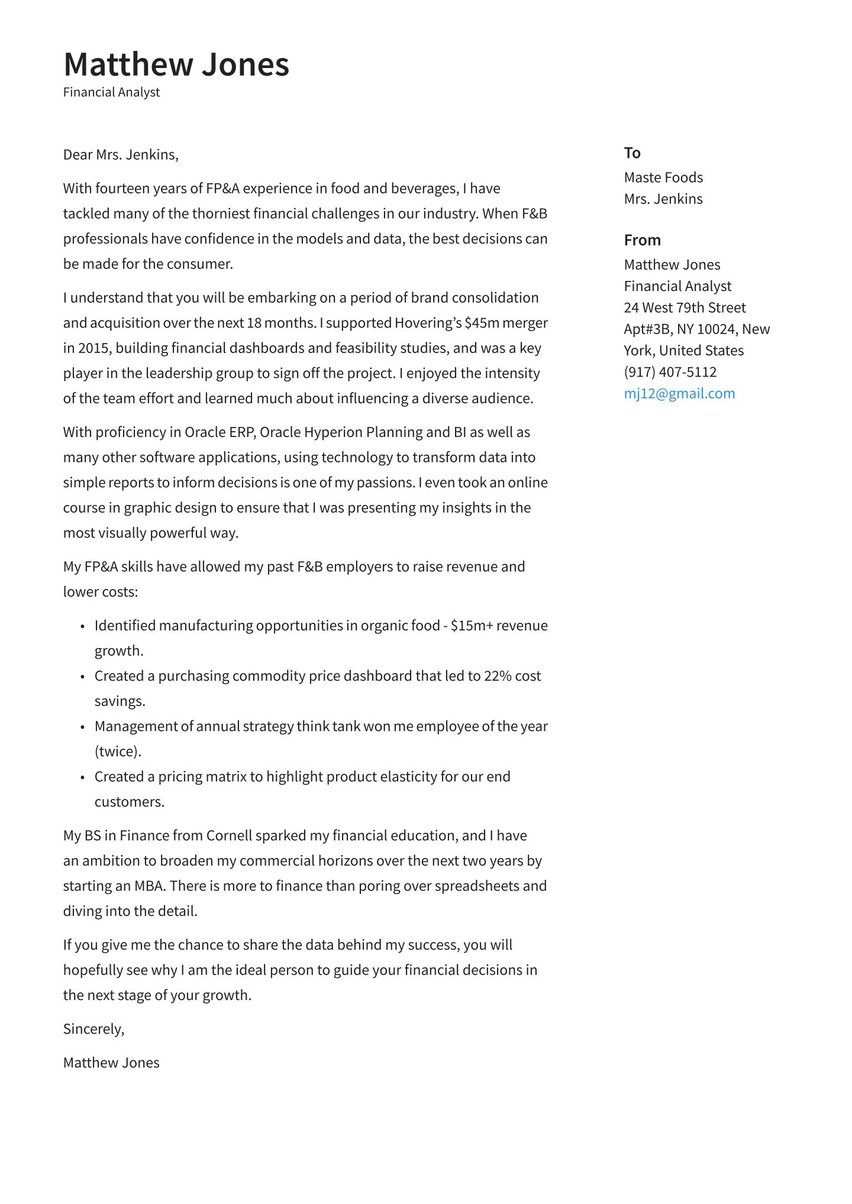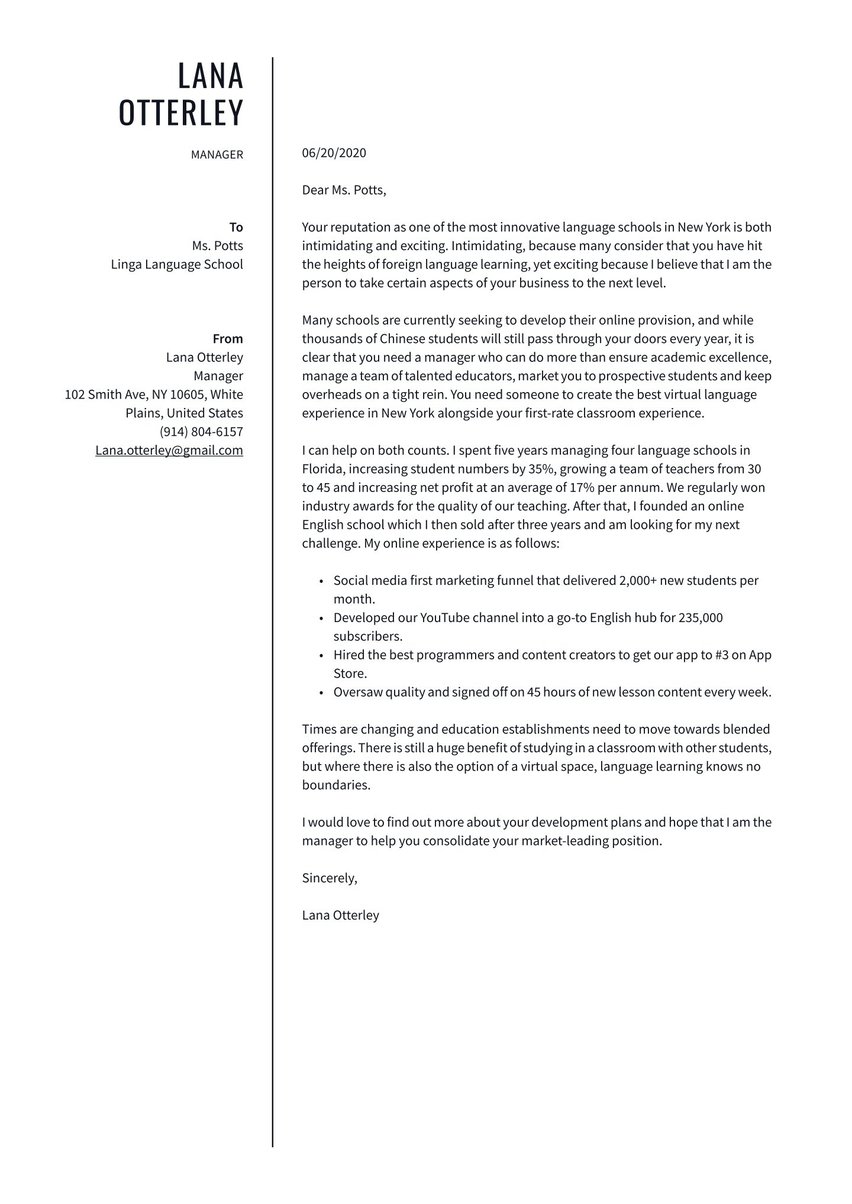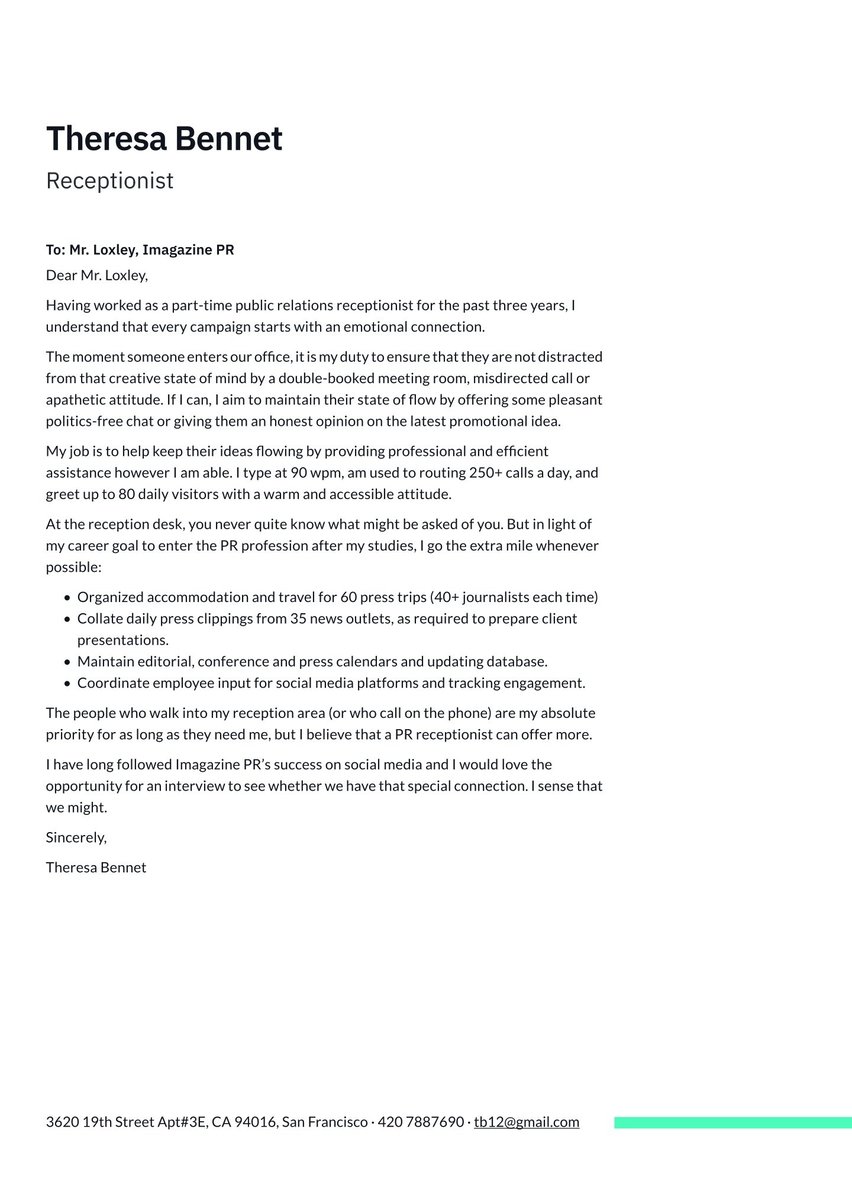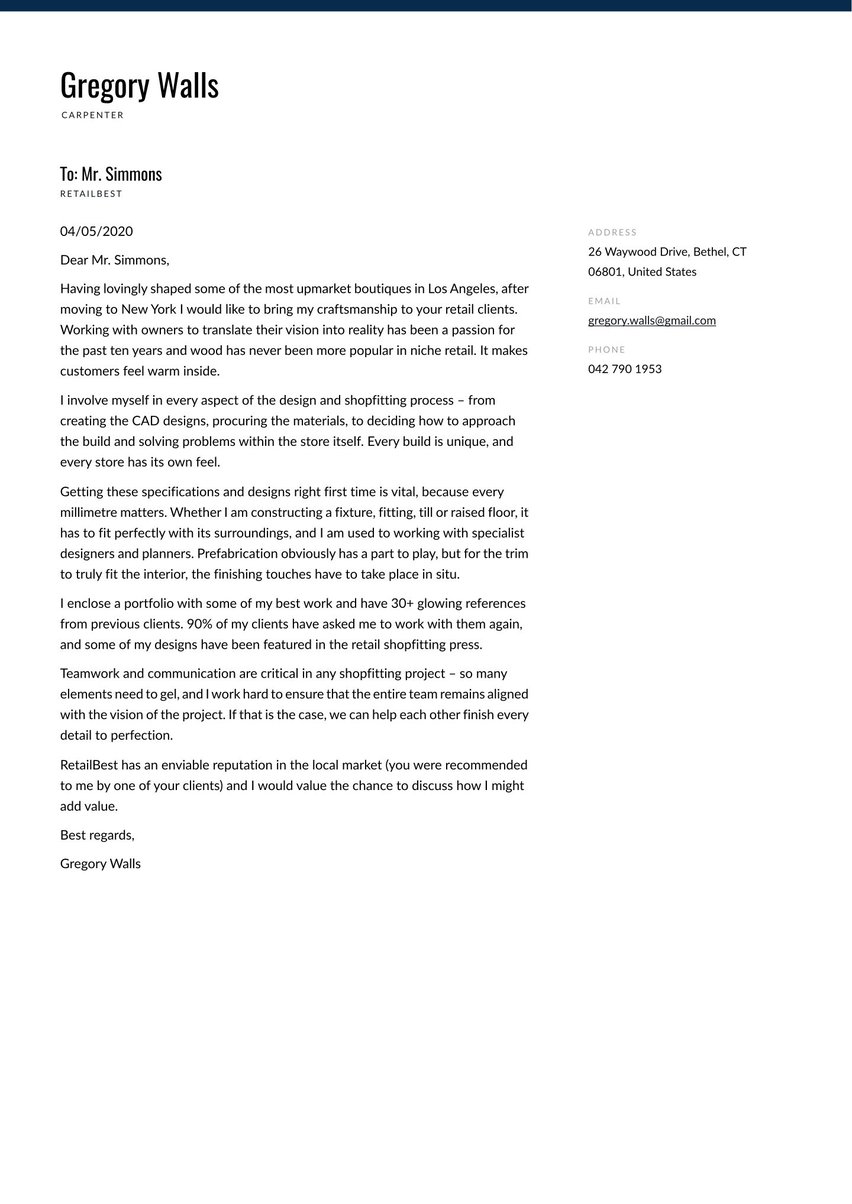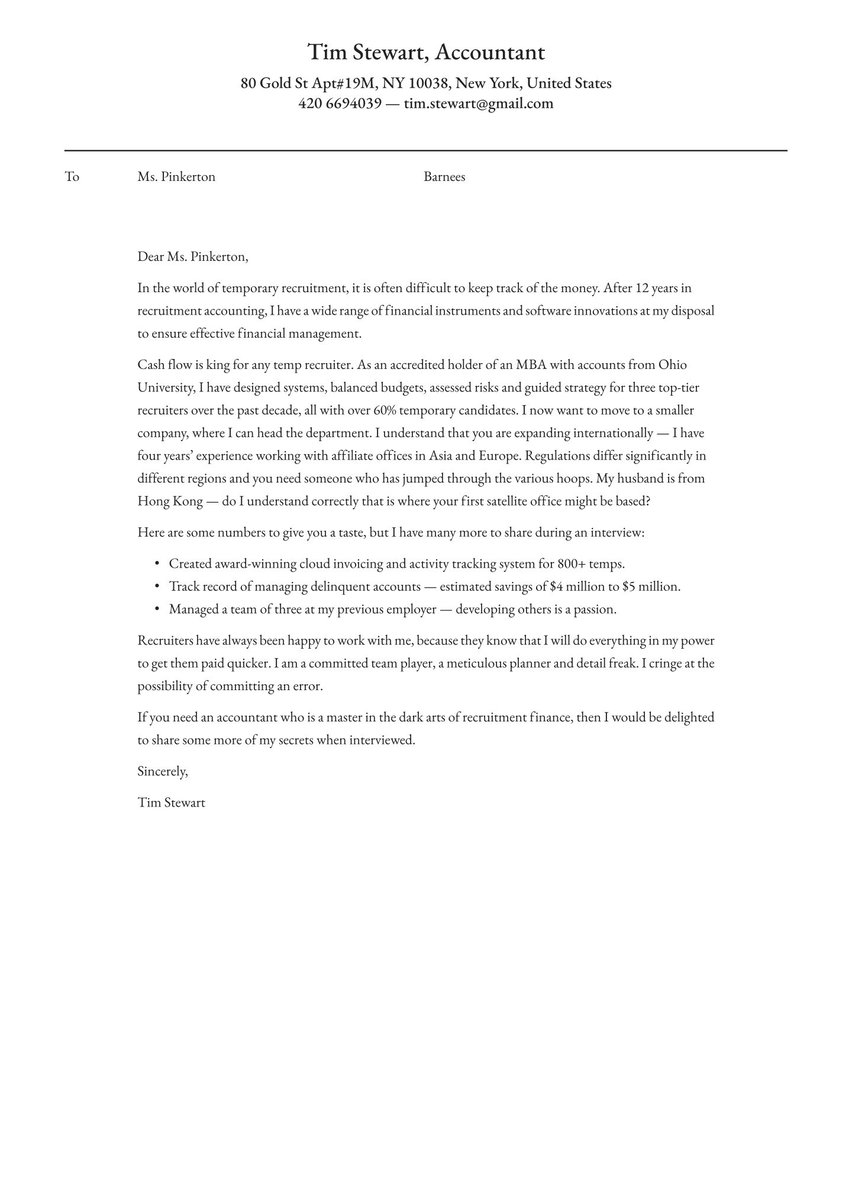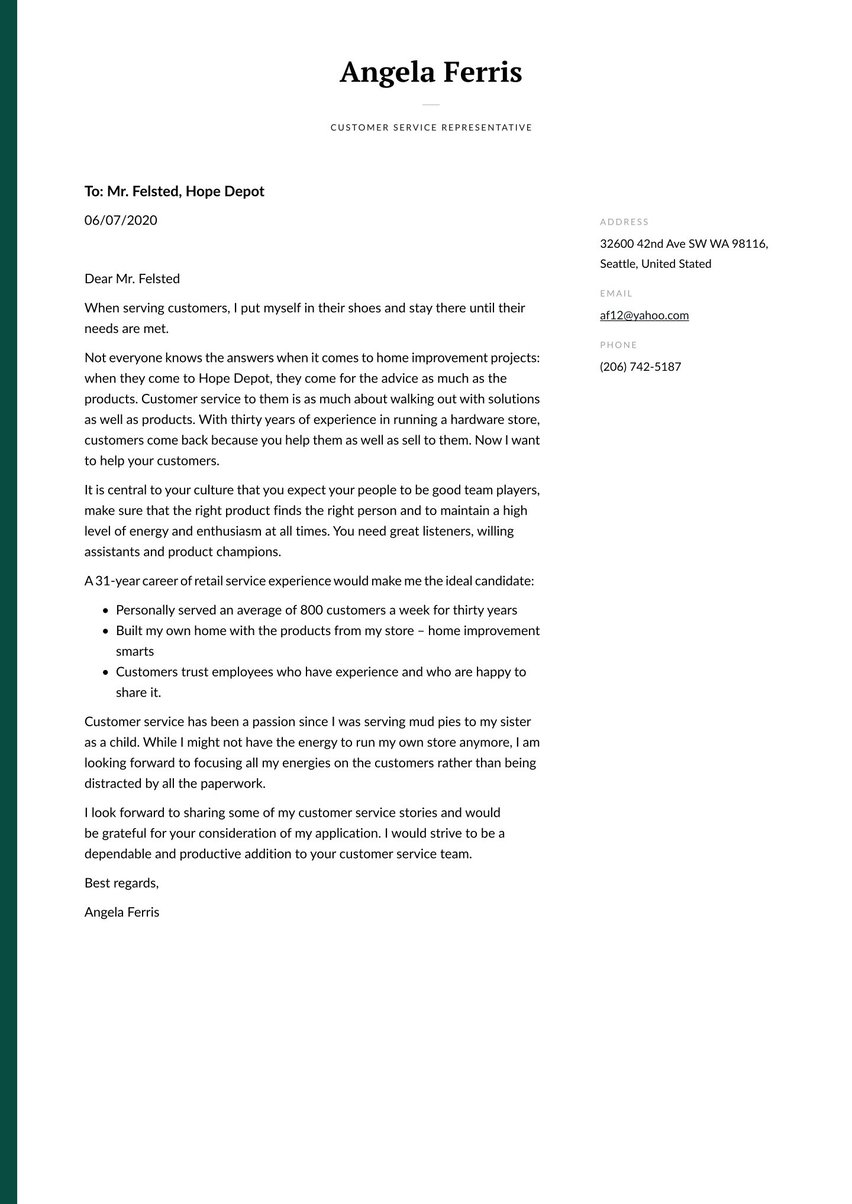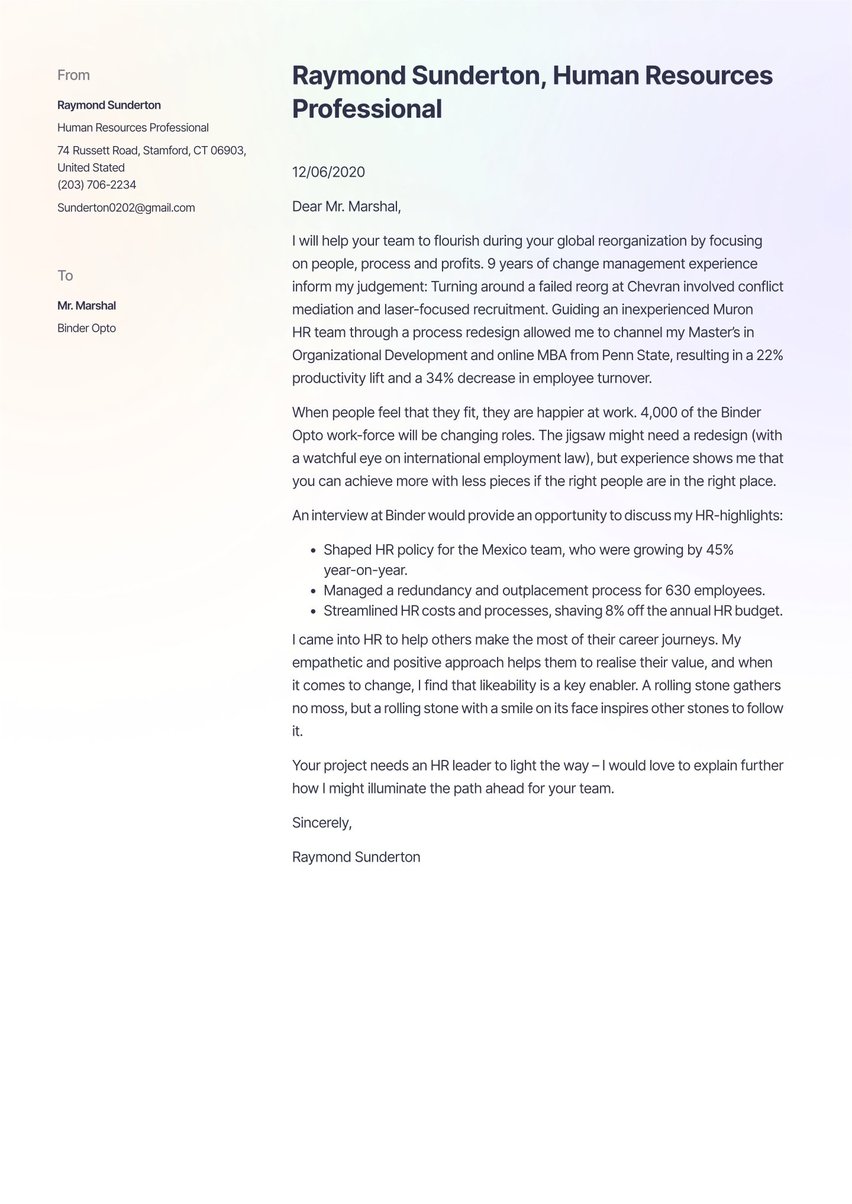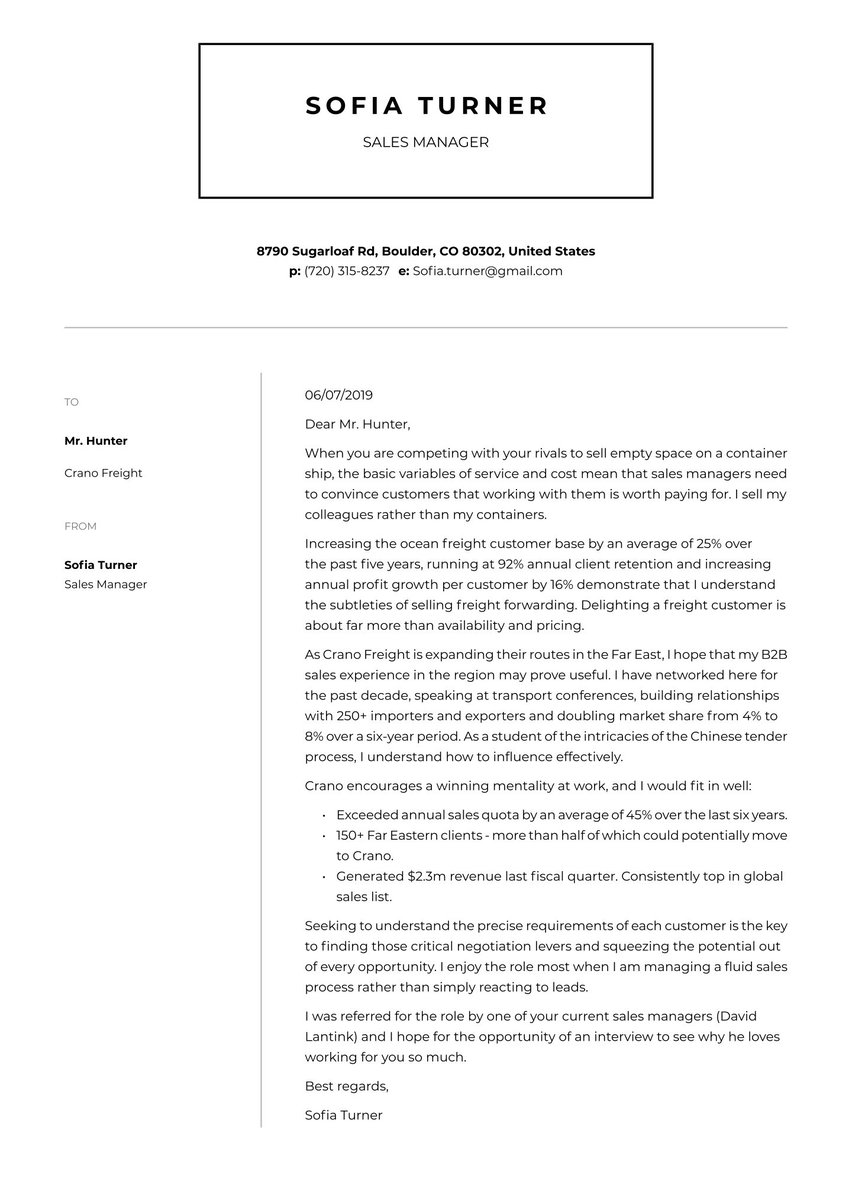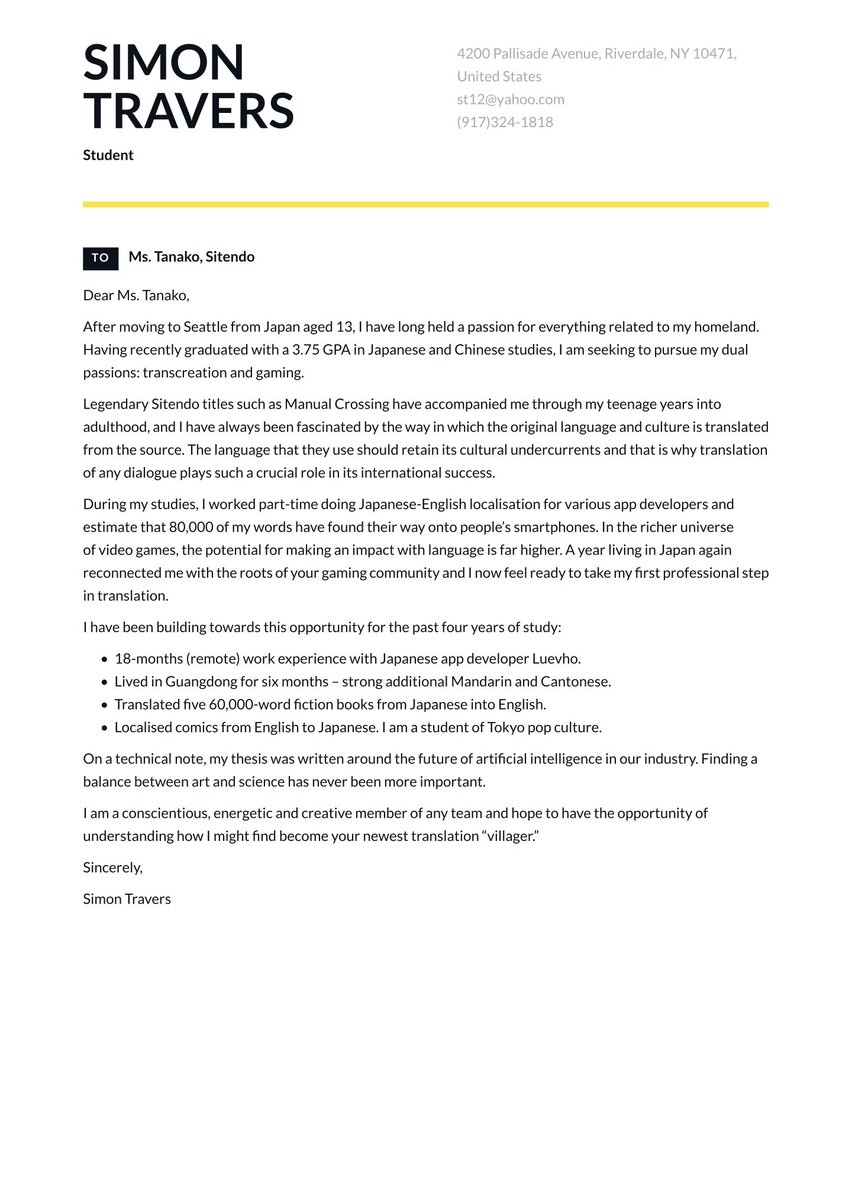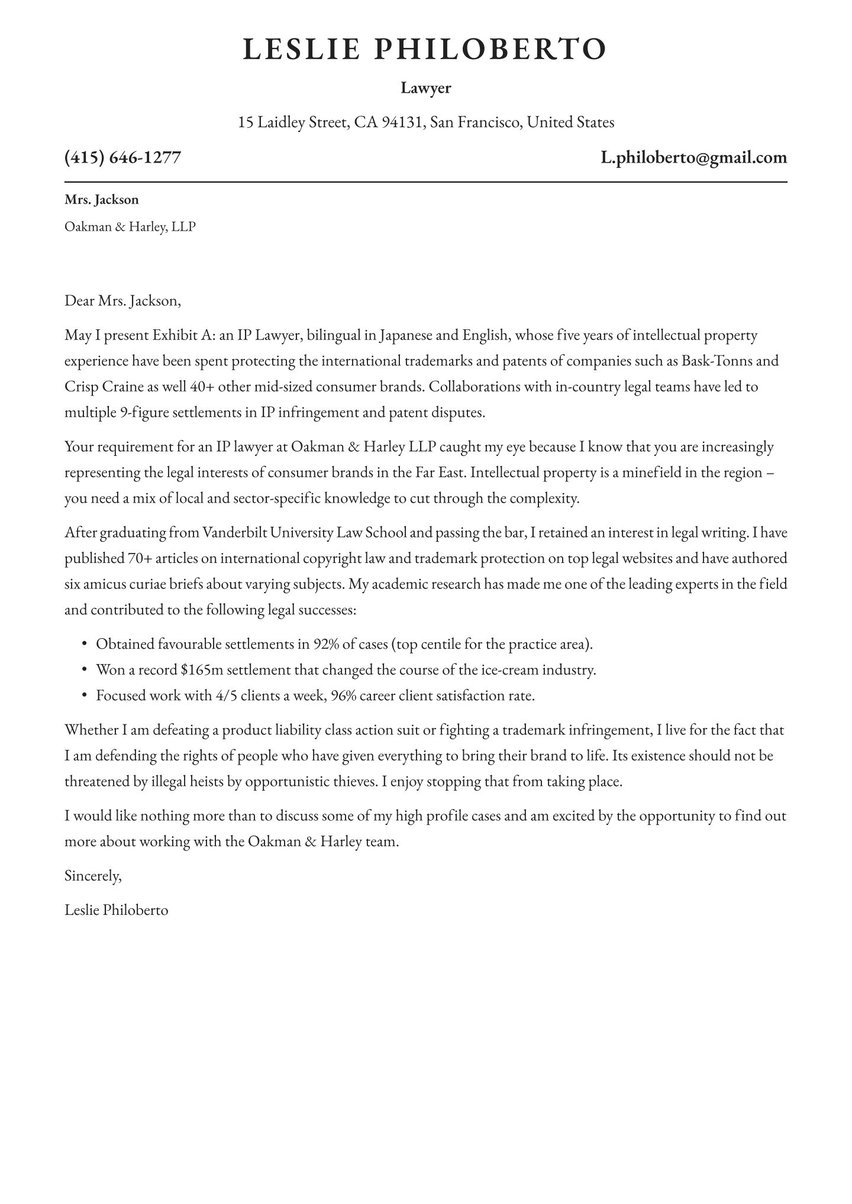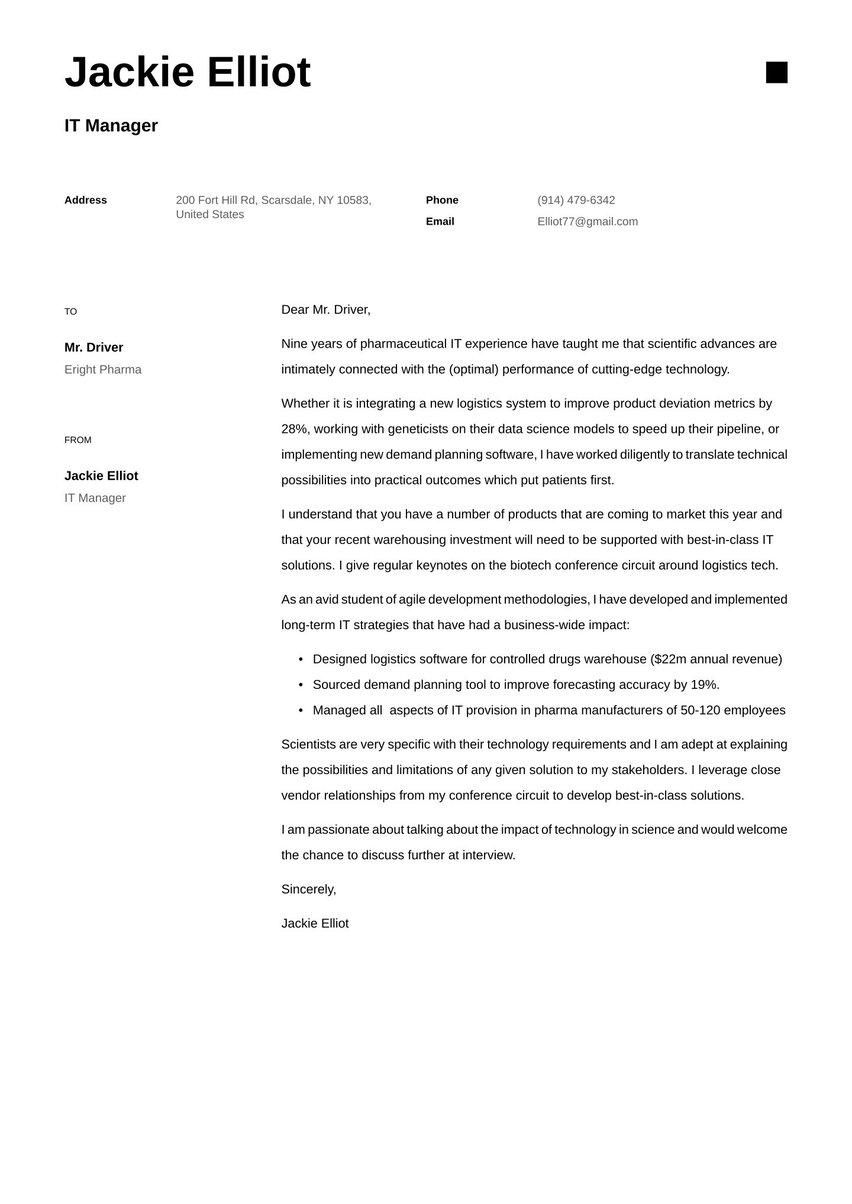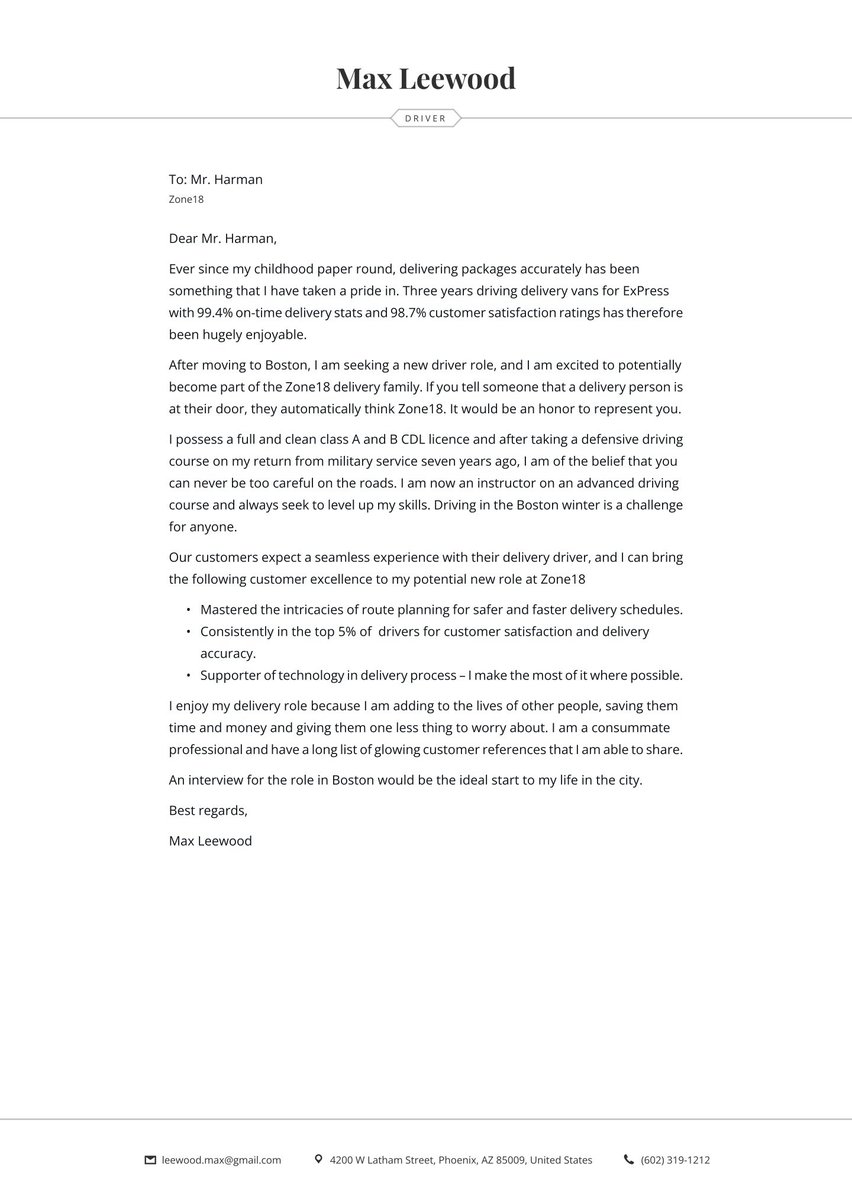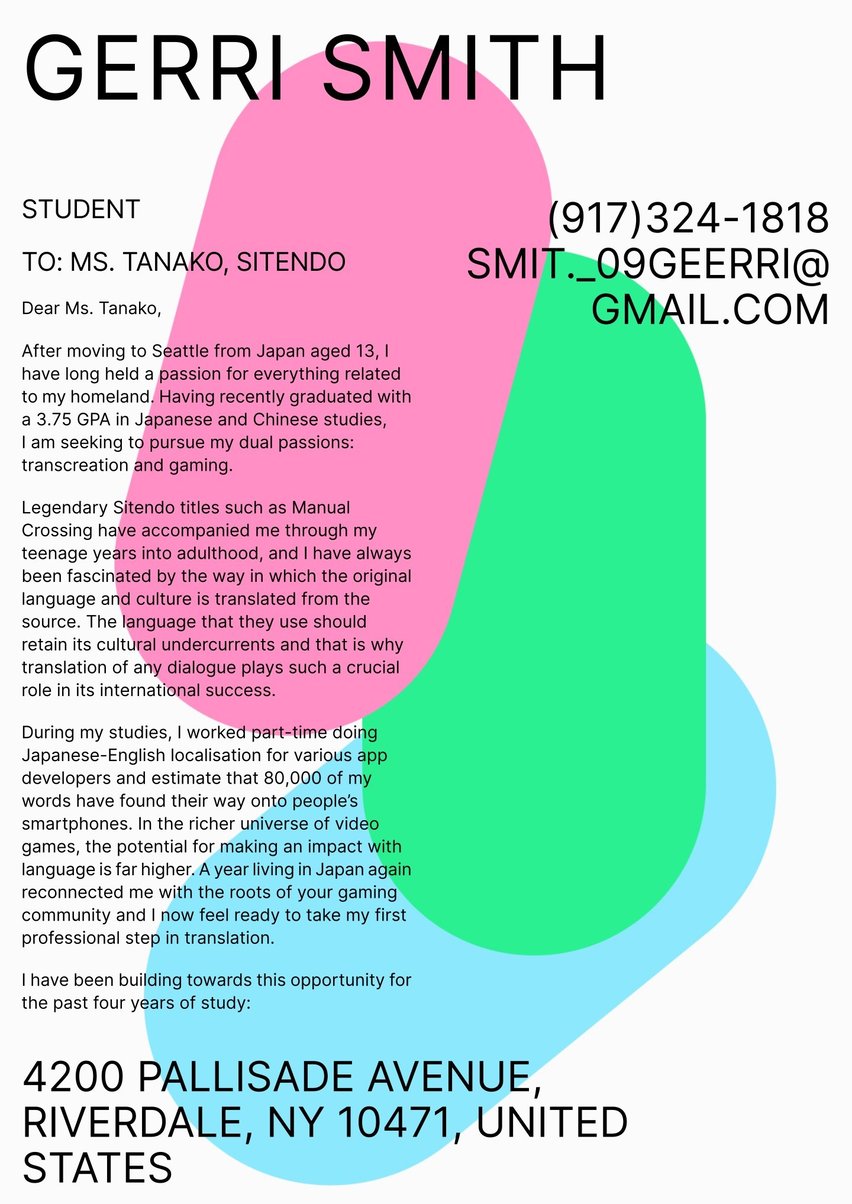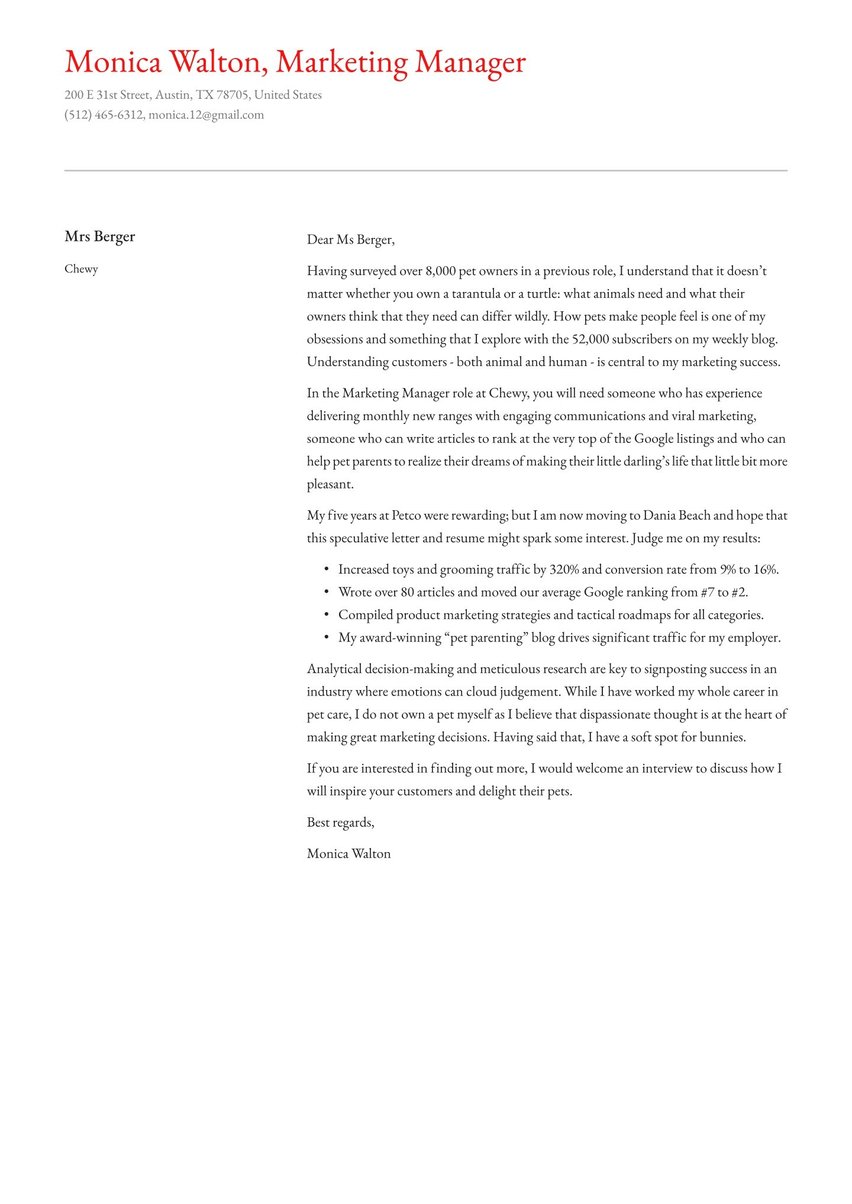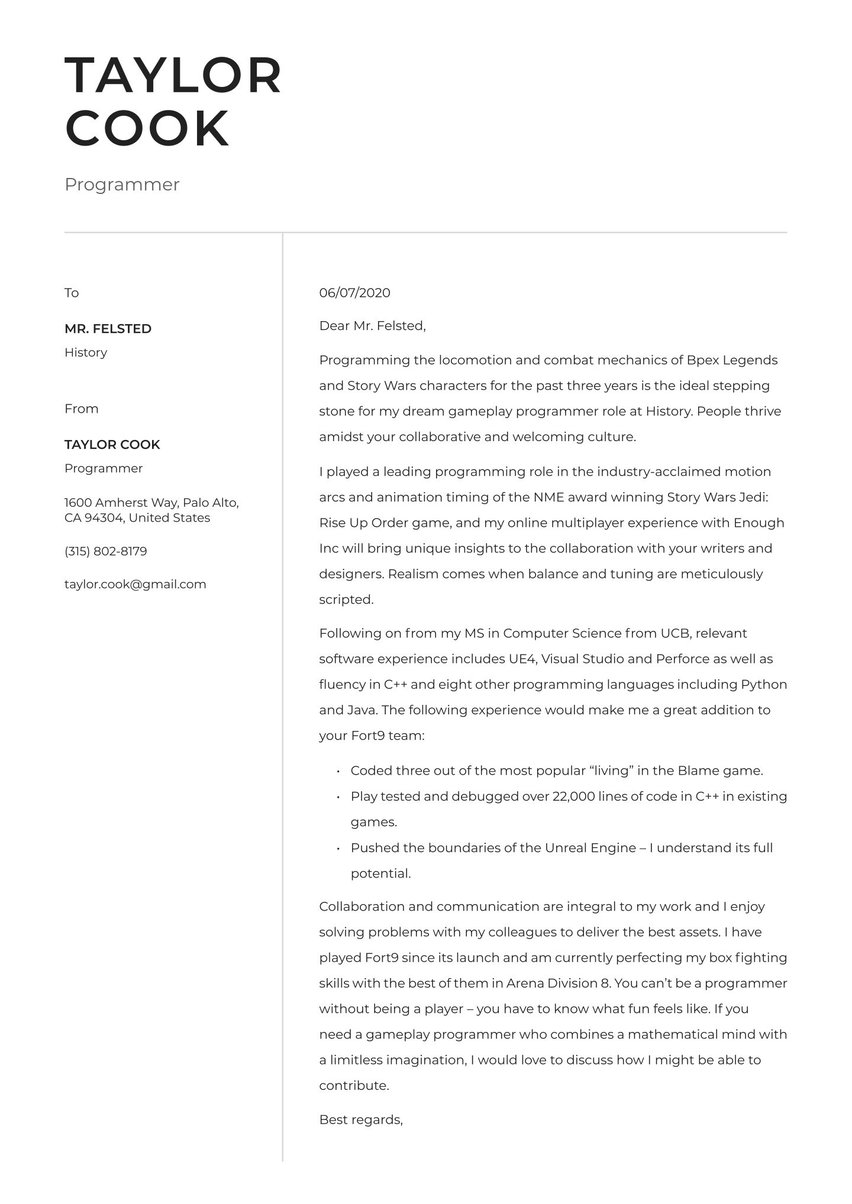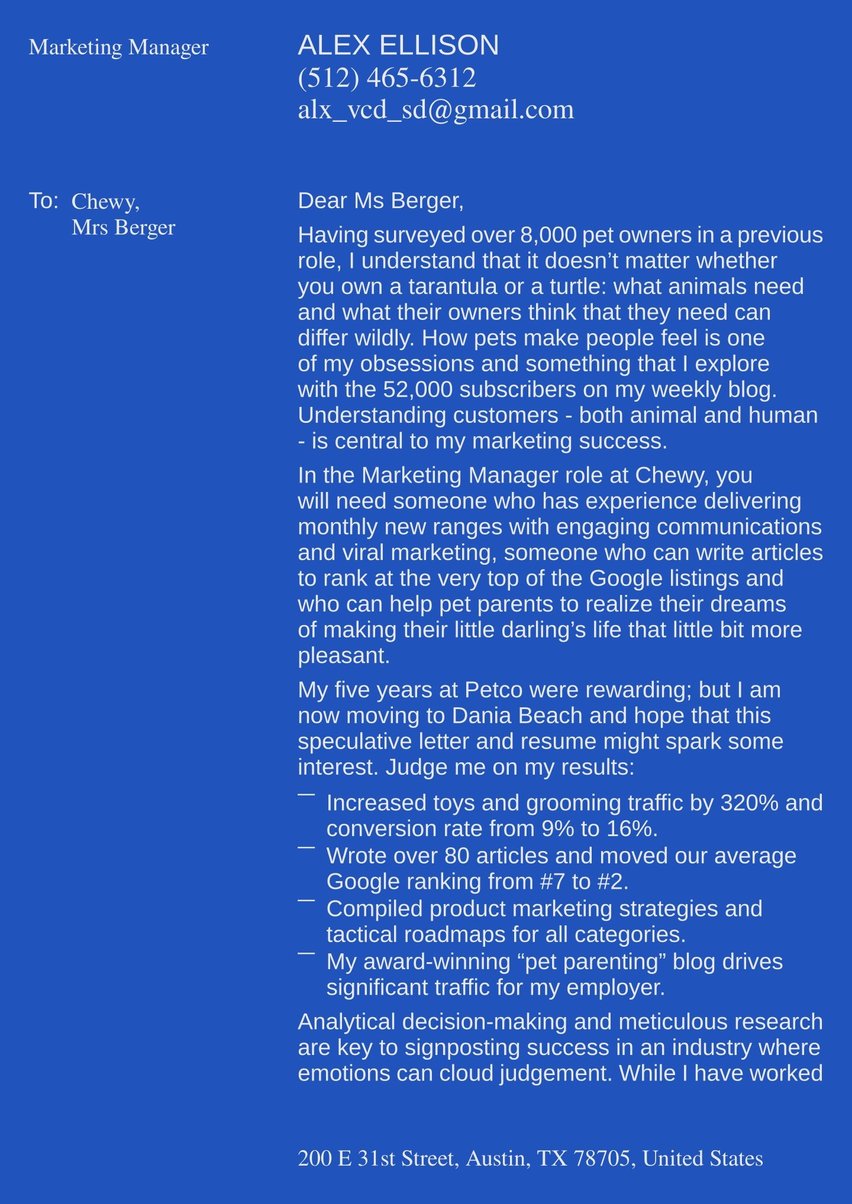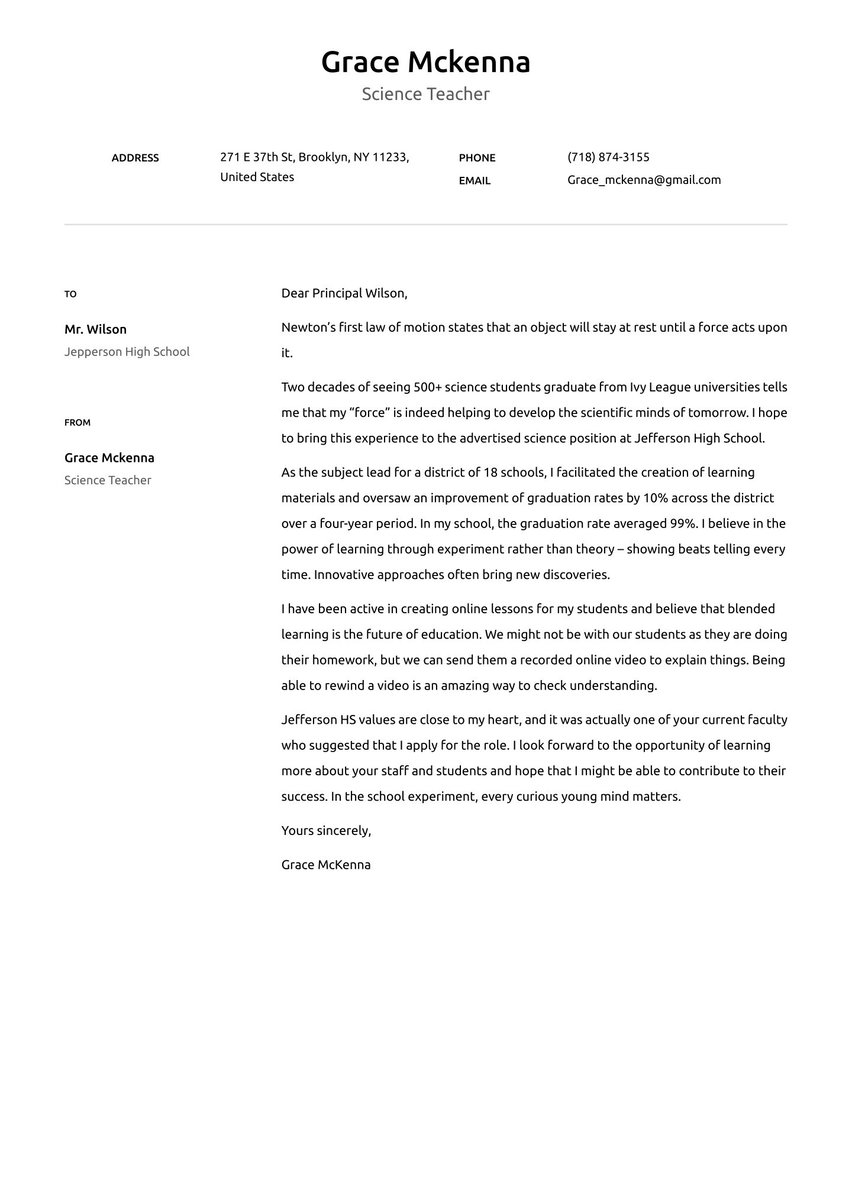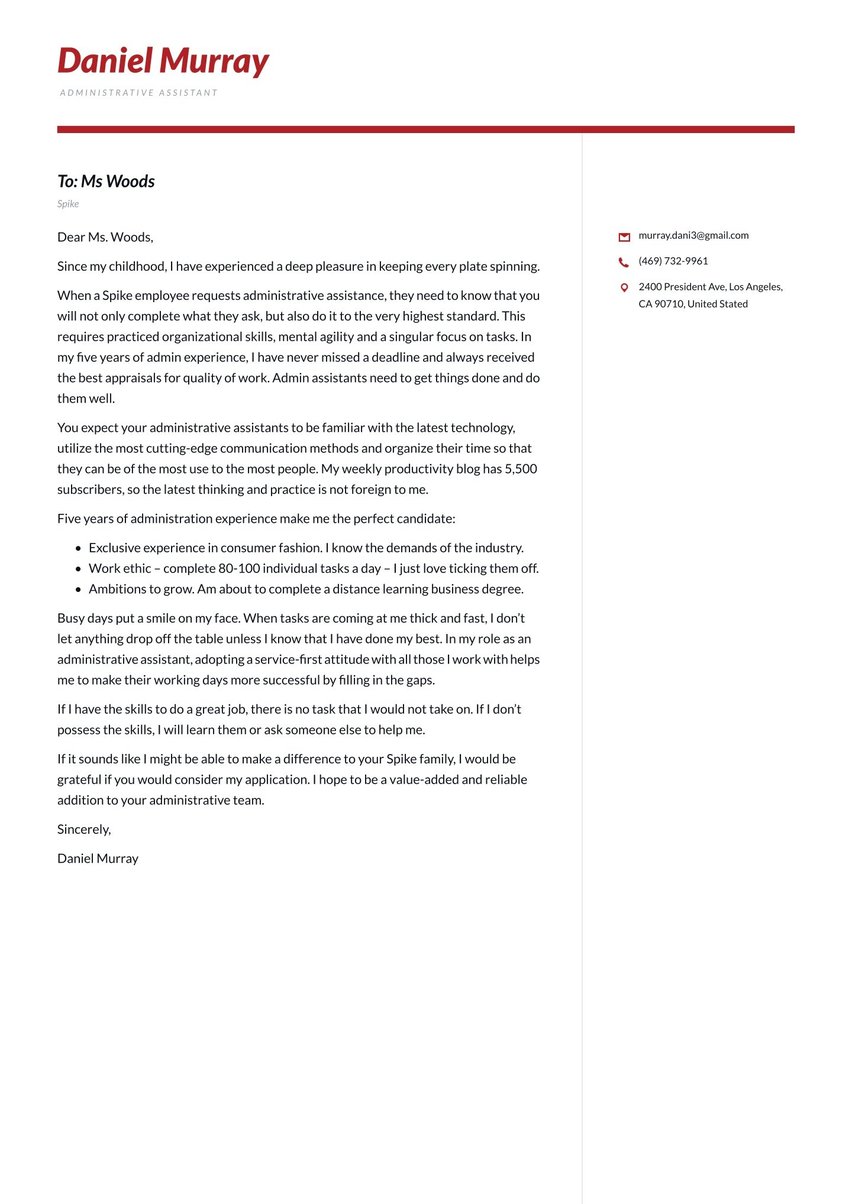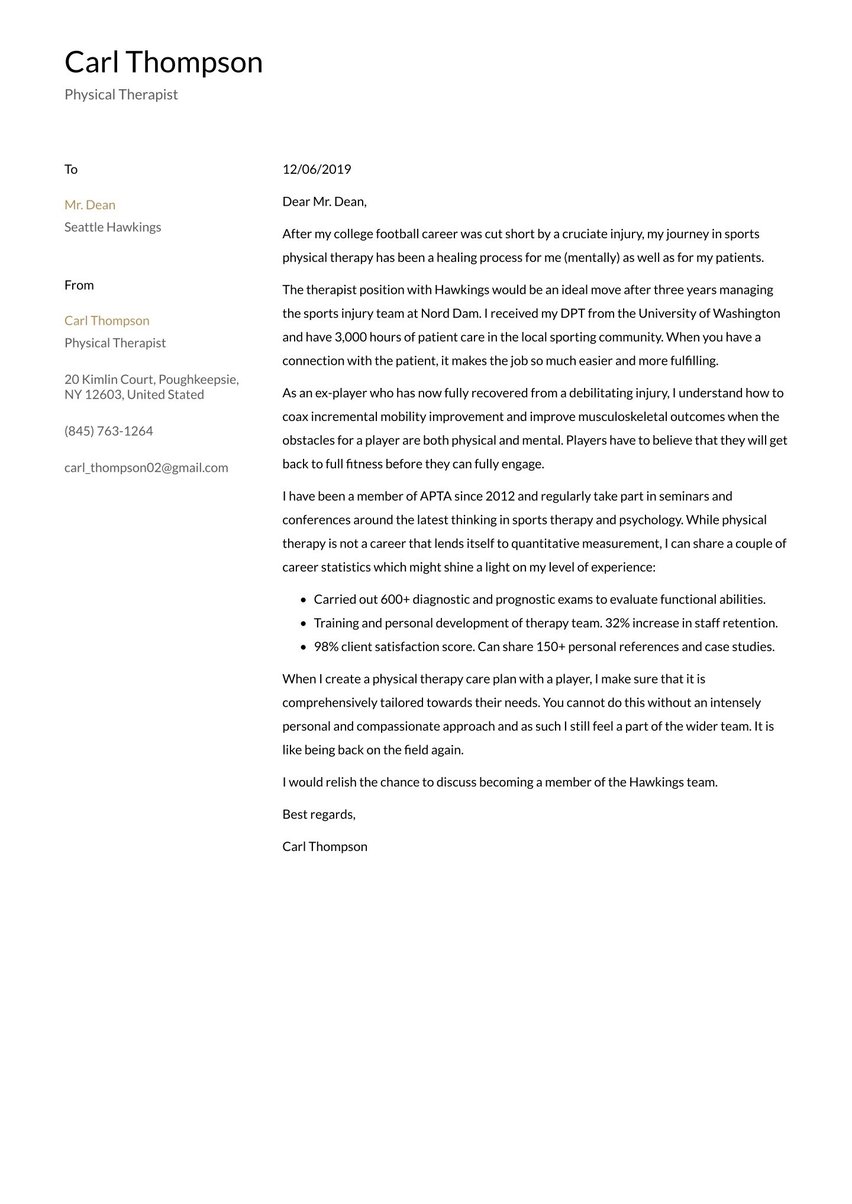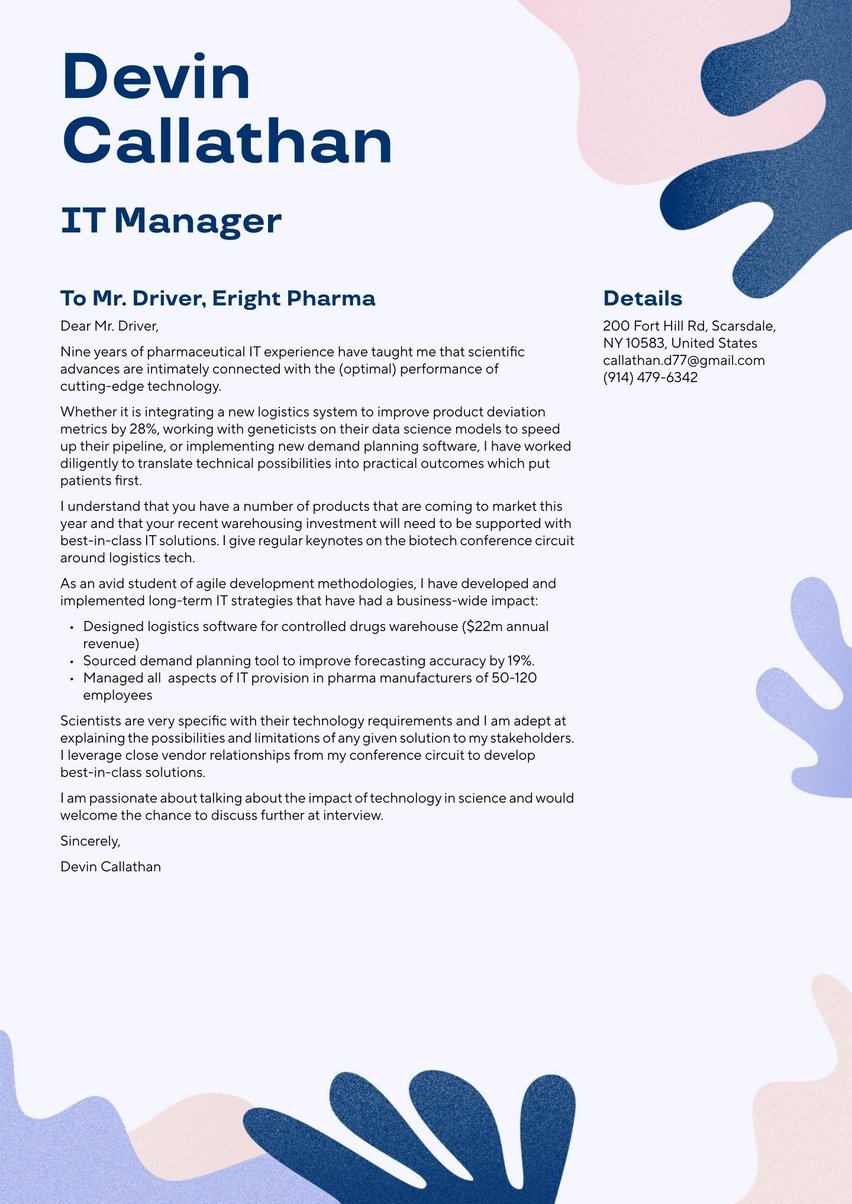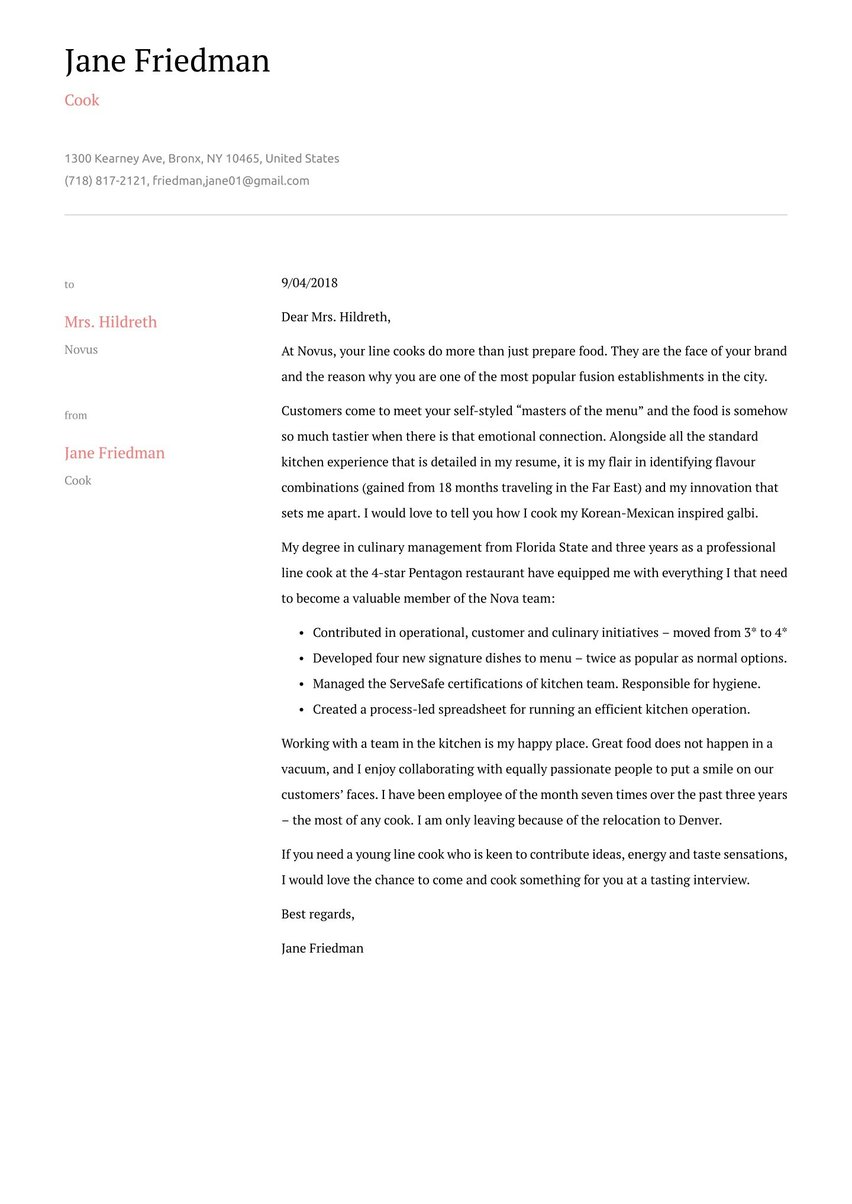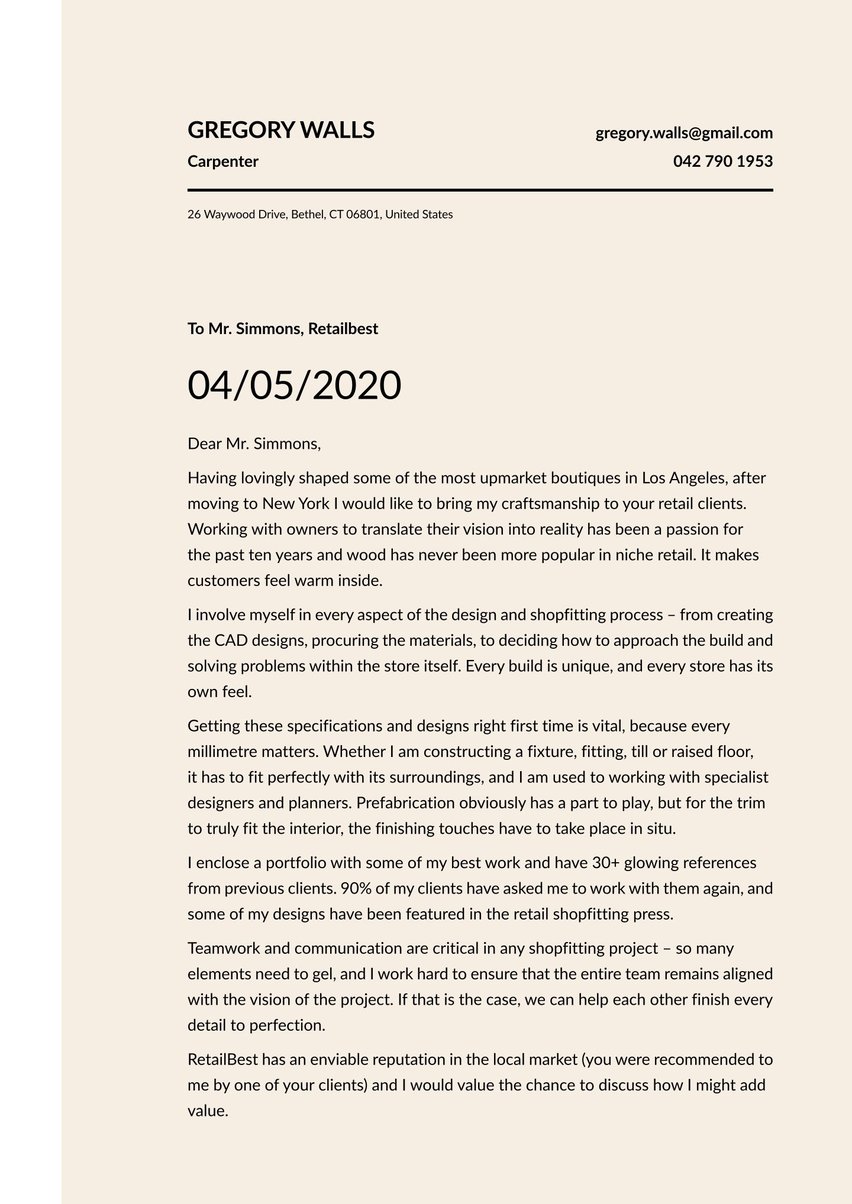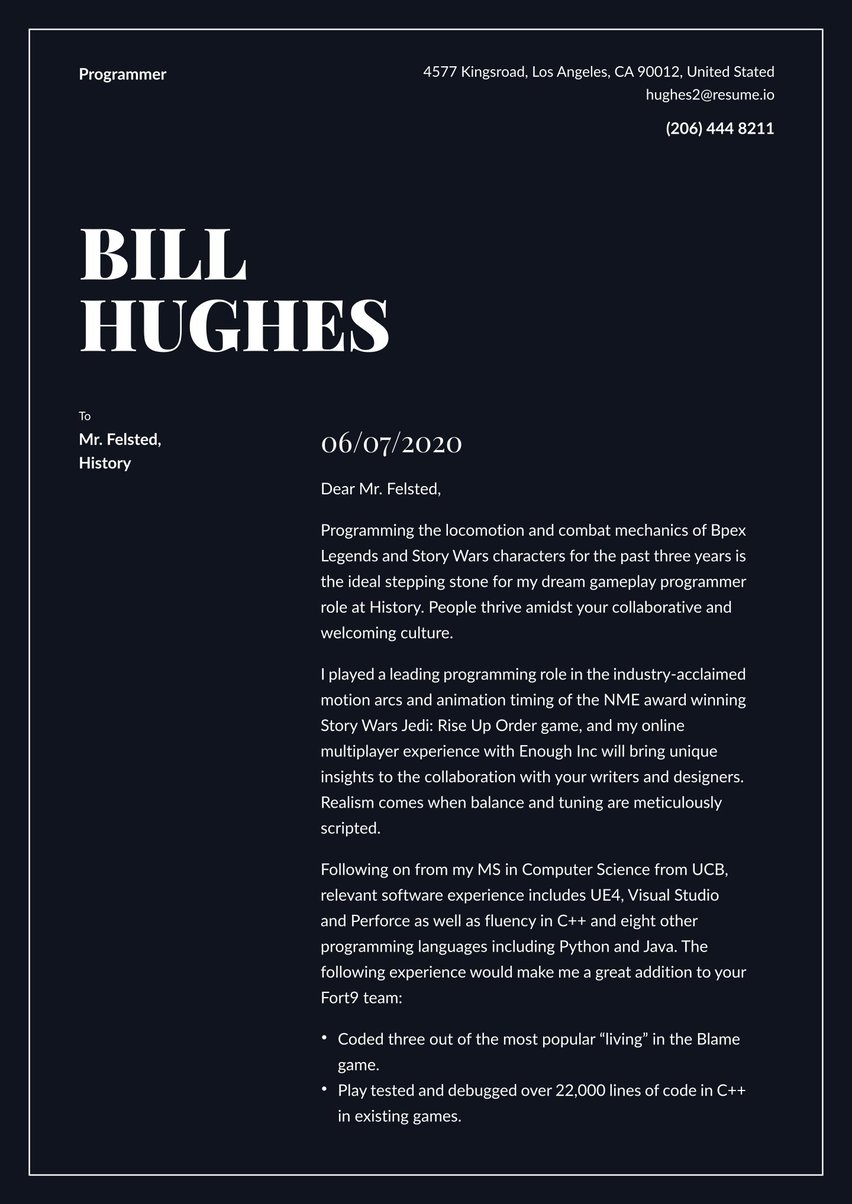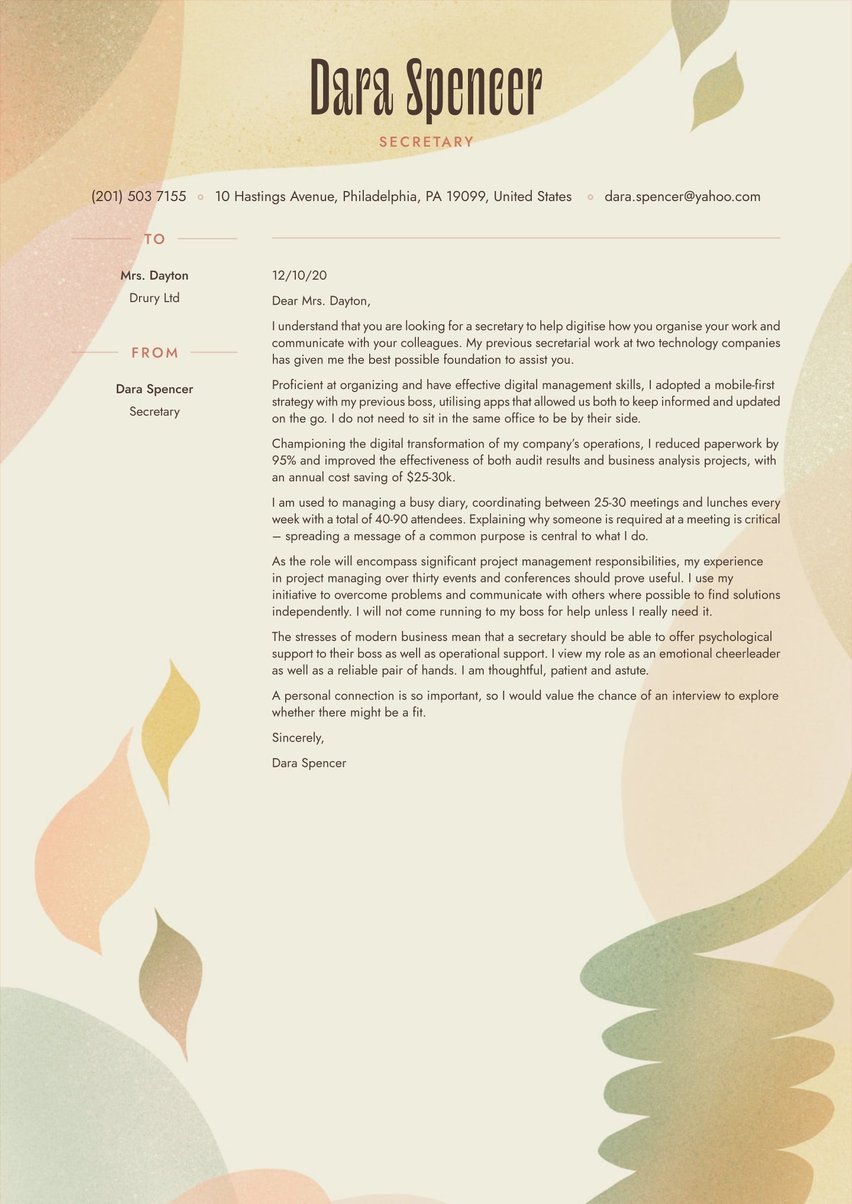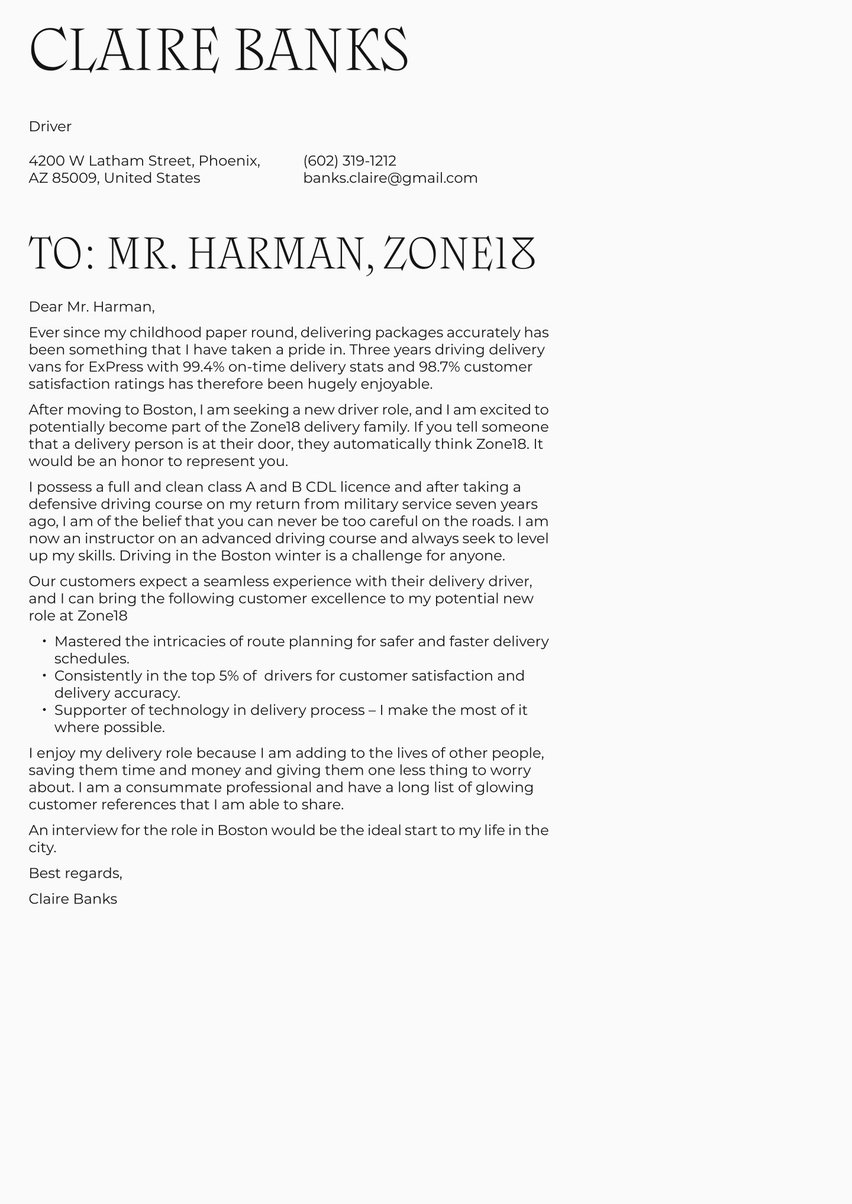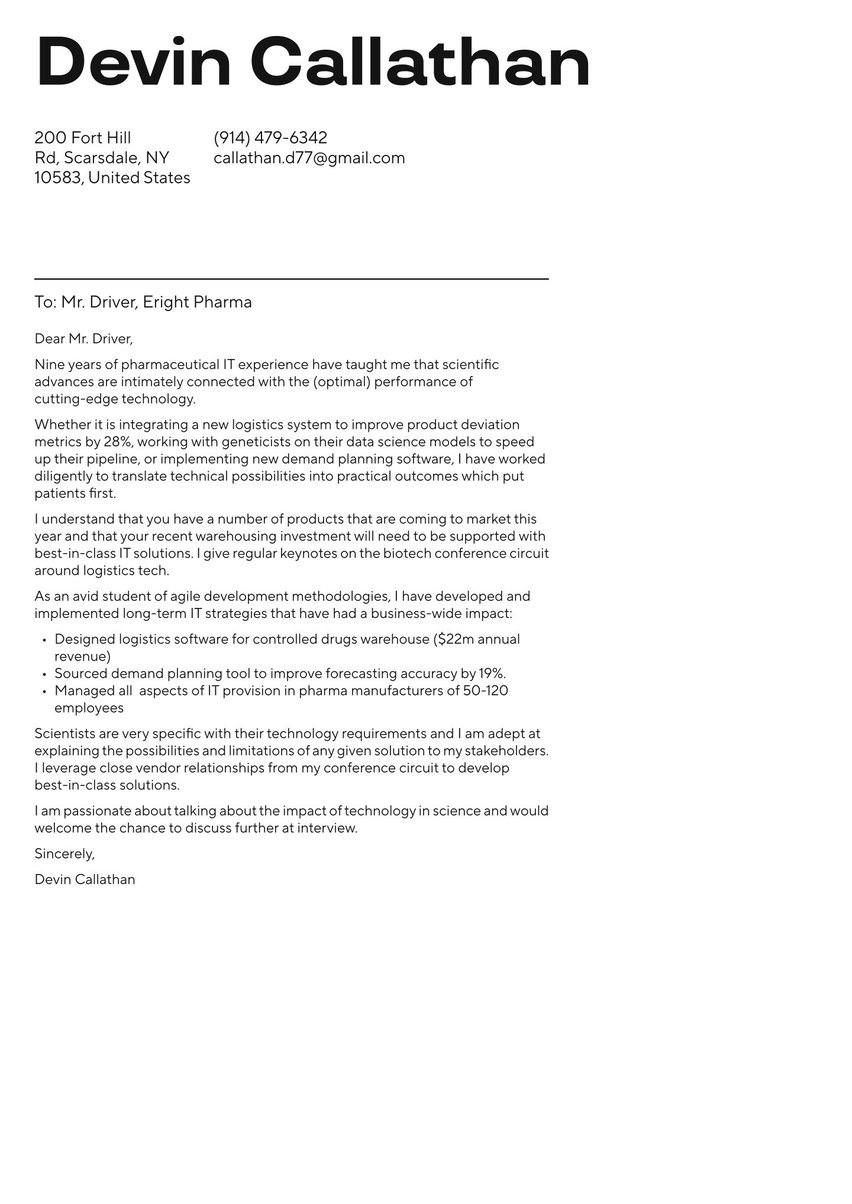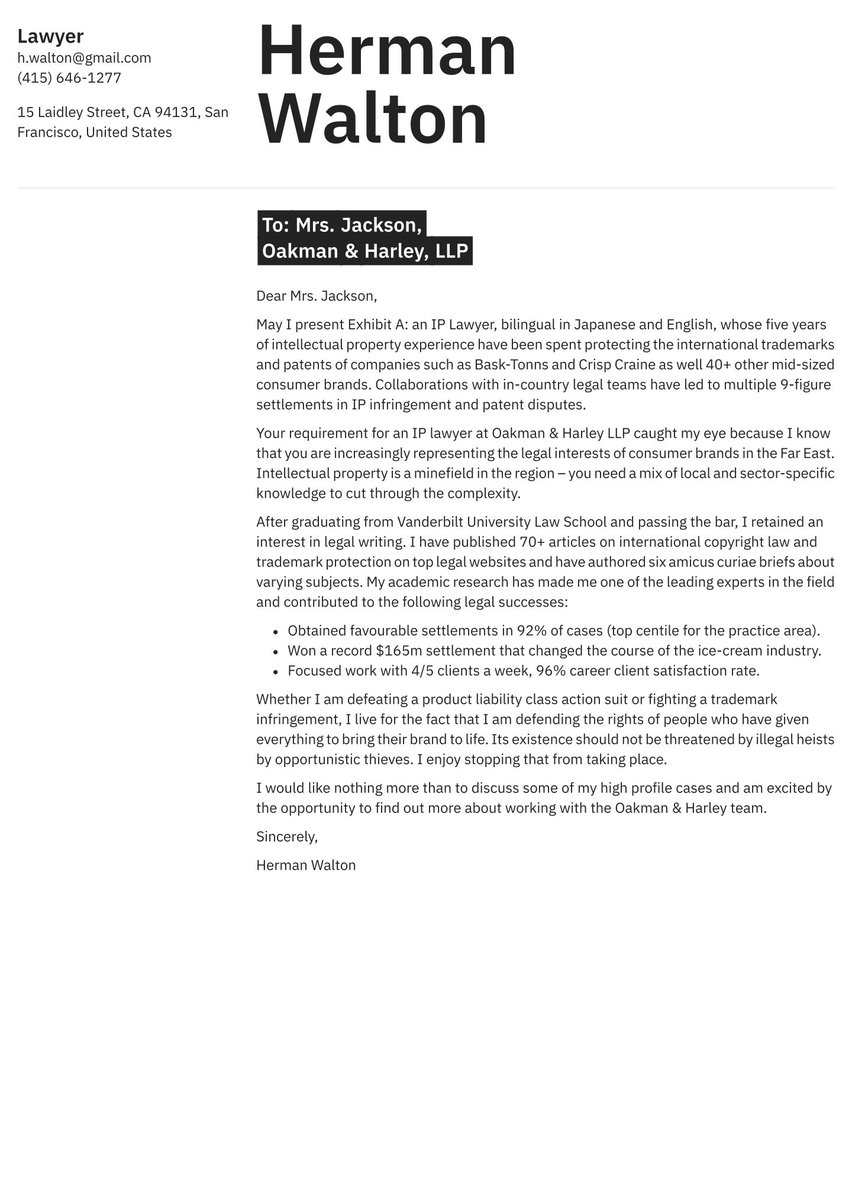Whether you’re an experienced RN or only have a few years under your belt, you’re looking at a job market that needs you. However, an exceptional nursing cover letter is still essential to stand out among other qualified applicants wearing the same scrubs.
A boring cover letter won’t help you get your foot in the (hospital) door. Increase your chances of success with a cover letter that grabs the hiring manager’s attention and gives them the “shot” they need to take the next step in the hiring process.
How can you accomplish this with just a cover letter? Creativity, conciseness, and the willingness to place your skills and expertise in the spotlight.
Nursing full text-only cover letter example
Dear Dr. Rowntree,
I write to express an interest in your accelerated nurse midwifery programme for recently-qualified CNMs. During my seven-year nursing career, I have always sought to learn from the best, and there is no better place than at Mount Bisai.
After graduating with a BSN from NYU Rory Meyers College of Nursing I worked as a licensed RN for four years and then decided to take my Masters in Nurse Midwifery. I passed my CNM two years ago, and as a relatively recent Certified Nurse Midwife, I am conscious that the learning process has now firmly moved into the delivery room.
A broad range of experience from prenatal to delivery and postpartum care ensures that I can make a difference in terms of caring for my patients’ needs. I have worked with obstetricians on 150+ complicated cases and while I have a firm grounding in high-risk conditions, I am keen to take on more theory and practice at Mount Sinai. I was commended for lowest rates of C-sections amongst my graduating cohort and I believe that my empathetic interpersonal skills have been vital in offering the highest level of care.
Education is an important aspect of the birthing journey and I strive to take every opportunity to advise around nutrition, exercise, rest and general wellness. Every day matters.
I have 90 letters of recommendation from new parents – many of which focus on how my prenatal efforts have contributed to a sense of calm preparedness when it is time for baby to arrive.
I would welcome a chance to get to know your maternity team and glimpse what I might be like to work with you. I love the job and I want to be the best midwife that I can be.
Yours sincerely,
Jackie Elise
Sections of a nursing cover letter
Writing a cover letter for a nursing role is like following a patient’s care plan: each section of the plan brings you one step closer to meeting your goal, in this case, a new position.
- Cover letter header. At the top, provide your contact details and the date. They need to know who they’re dealing with!
- Greeting. Greet the recipient by their full name—it’s polite, professional, and shows you mean business.
- Introduction. Make them feel secure by telling them why you’re the person for the job.
- Body. This is the core of your letter. Give an overview of your skills, achievements, and expertise. Let them know you can fill the healthcare facility’s needs and goals, adding context to your professional journey.
- Conclusion. End your letter by briefly restating your qualifications and enthusiasm for the role. Then, take the initiative and provide a call to action.
- Signature. Seal the deal with a professional sign-off, and give them your name again.
Your goal is a one-page cover letter that is more than a laundry list of your impressive qualifications. It’s a short story that weaves them into your career narrative and demonstrates how you’d fit into their staff. It’s the key to going beyond being just another applicant and demonstrating how you and the facility could work together towards perfect “health” between you, the facility, and the patients you serve.
Need more inspiration? View our other related cover letter examples from the healthcare sector:
If you need more details on each section, view our article on how to write a cover letter.
Once you’ve written your header and addressed the hiring manager, it’s time to introduce yourself.
Introduction of a nursing cover letter
Start a cover letter for a nursing position from a position of authority and offer a particularly impressive achievement up front.
This is the prep work before the procedure. Maybe you revamped the scheduling system which resulted in significant time savings or successfully trained a large number of nursing students.
Dear Ms. Hannah Jones,
As an experienced, dedicated nurse with 10+ years of outstanding patient care, I am excited about the opportunity at St. Eligius Hospital. At County General Hospital, I have been named employee of the year twice ( 2020 and 2022) and received multiple recognitions and accolades for my superior patient care skills. I would be honored to replicate this success at St. Eligius.
Greetings. I’m Bonnie, and I’m applying for the nursing position at St. Eligius. I’ve been a nurse for over 10 years and think I’d be a good fit.
Don’t open with “I am writing to….” They already know why you are writing. Instead, show, don’t tell: demonstrate your skills in action.
For example, if you led an initiative that resulted in a '5% reduction in scheduling waste,' lead with that. Quantifiable data adds credibility and illustrates how your skills can benefit a potential employer.
This is more than a list of skills; it allows you to align your skills with the medical facility’s needs. This motivates the personnel director to keep reading and consider you a leading candidate for the position right off the bat.
Dear Dr. Rowntree,
I write to express an interest in your accelerated nurse midwifery programme for recently-qualified CNMs. During my seven-year nursing career, I have always sought to learn from the best, and there is no better place than at Mount Bisai.
Nursing cover letter body
The body is the “guts” of your cover letter, where you’ll:
- Place your experience and skills front and center.
- Demonstrate why you fit in perfectly with the facility’s values and goals. This is critical regardless of whether you're applying as a nurse, LPN, or nurse practitioner.
- Tie it all together with a conclusion that makes an impression.
- Finish off with a motivating call to action that encourages the hiring manager to call you for an interview.
First body paragraph: your suitability for the role (skills & experience)
Start strong by showcasing the key skills and expertise that make you the best person for the job. It’s the first step in your professional narrative.
To accomplish this, follow these steps:
- Emphasize your education. Talk about how your nursing degree(s) have provided a solid foundation for building your skills.
- Emphasize your patient skills. Illustrate how you’ve been able to work with patients from diverse backgrounds. Tell stories that shine a spotlight on your organizational and communication skills.
- Computer literacy. These days, all healthcare professionals need up-to-date tech skills. Perhaps you’re the “go-to” person for the scheduling or patient chart systems. These details demonstrate your commitment to using the latest tech to support patient outcomes.
- Problem-solving and multitasking. Discuss instances when you successfully handled a large caseload while overseeing the nursing staff in a busy hospital or during an emergency.
- Contribution to medical publications. Mention any instances where you contributed to medical research or wrote articles for a professional journal.
- Participation in community health programs. Discuss your participation in off-site disease prevention screenings, or informational presentations at the local school. These show your dedication to public health and investment in the community.
- Supervisory roles. Touch on your experience in staff scheduling, training, or as a nursing supervisor. Don’t be shy—you’ve handled everything from nervous student nurses to finding last-minute coverage for your department—let them know you’ve seen it all.
Align document styles
Use the same fonts, font sizes, and formatting styles in your cover letter and resume. An employer should be able to hold your cover letter in one hand and your resume in the other and see at a glance that they came from the same person.
Consistency shows that you’re organized and you pay attention to detail. It gives you a visual brand and makes you more memorable. The writing style in your resume and cover letter should also be similar, though you should beware of repeating the same phrases in the two.
Goal of the cover letter header: Stand out from other nursing candidates with a distinctive-looking header that identifies who you are and how recruiters can reach you.
Second body paragraph(s): alignment with the organization
Hospitals and other medical facilities all have healthcare goals and corporate values and want to hire people who align with them. Research the facility and see what it is about their mission statement that resonates with you.
Demonstrate how your personal and professional values and expertise align with theirs, showing them you’re qualified for the role and can contribute to furthering their goals and mission.
In this example from Northwestern Memorial Hospital, some key points that can be gleaned from their mission statement include:
- We put patients first.
- We are all caregivers or someone who supports a caregiver.
- We are here to improve the health of our community.
- We have an essential relationship with Northwestern University Feinberg School of Medicine.
- We integrate education and research to continually improve excellence in clinical practice.
- We serve a broad community and strive to bring the best in medicine closer to where patients live and work.
Weave specific examples from the hospital’s mission statement into your cover letter. If you have a personal story you can share, such as watching dedicated nurses care for an ailing family member (and how it inspired you), include that as well. This shows a sincere regard and a profound connection with their values.
After graduating with a BSN from NYU Rory Meyers College of Nursing I worked as a licensed RN for four years and then decided to take my Masters in Nurse Midwifery. I passed my CNM two years ago, and as a relatively recent Certified Nurse Midwife, I am conscious that the learning process has now firmly moved into the delivery room.
A broad range of experience from prenatal to delivery and postpartum care ensures that I can make a difference in terms of caring for my patients’ needs. I have worked with obstetricians on 150+ complicated cases and while I have a firm grounding in high-risk conditions, I am keen to take on more theory and practice at Mount Sinai. I was commended for lowest rates of C-sections amongst my graduating cohort and I believe that my empathetic interpersonal skills have been vital in offering the highest level of care.
Education is an important aspect of the birthing journey and I strive to take every opportunity to advise around nutrition, exercise, rest and general wellness. Every day matters.
I have 90 letters of recommendation from new parents – many of which focus on how my prenatal efforts have contributed to a sense of calm preparedness when it is time for baby to arrive.
Call to action & conclusion: bring to a successful close
Encapsulate your cover letter by restating your main points and your zeal for the nursing position.
Incorporate a motivating call to action for the hiring manager to meet and discuss how your expertise and skills are aligned with the medical facility’s goals and values.
Always express your appreciation to the recruiter for their time and attention. It’s a professional move, but also reinforces your enthusiasm for the position.
Conclude with a polite but straightforward request to take the next step in the hiring process.
I would welcome a chance to get to know your maternity team and glimpse what I might be like to work with you. I love the job and I want to be the best midwife that I can be.
Yours sincerely,
Jackie Elise
Finish the letter by signing off with your name. This is both a professional and effective way to leave a good impression.
Get the basics right!
If you know the name of the person making the hiring decisions, use it in the greeting. People like to see their own names, and this practice proves that you are not sending a generic cover letter to various recipients.
Lean toward using the last name: “Dear Mr. Brown:”. If it’s a woman, beware of “Miss” or “Mrs.” and go with “Ms.” Of course, if you’re writing to a doctor of either gender, go with the title “Dr.”
In some cases, it’s impossible to tell from a name whether the person is male or female—it could be a British woman named Jean (Jeen) or a Frenchman named Jean (Zhan). In such a case, you might look for this person’s picture online or you might simply call the company and ask if Jean (or Alex, Chris, Dale, or Sam) is a man or a woman.
If you have no idea, your best fallback might be to break the last-name rule and simply write Dear Jean:”. However, some companies take pains to obscure the name of the actual hiring manager, and they might find it a bit disturbing if you’ve gone to great lengths to figure it out. In such cases, the best approach is often to make your greeting more generic, for example, “Dear XYZ team.”
Key takeaways
An effective nursing cover letter emphasizes your relevant skills, experiences, and dedication to the profession. From the beginning to the letter to the end, showcase your unique strengths and passion for nursing.
Provide concrete examples of how your skills, expertise, and values align with that of the medical facility, and how you’d meet any needs they currently have.
Kickstart your nursing job search with our cover letter generator and accompanying resume builder. But supercharge your efforts with resume.io.
Unlock 18 powerful tools to search for jobs, track your progress, ace your interviews, and negotiate the best salary—all within our comprehensive career toolkit.


